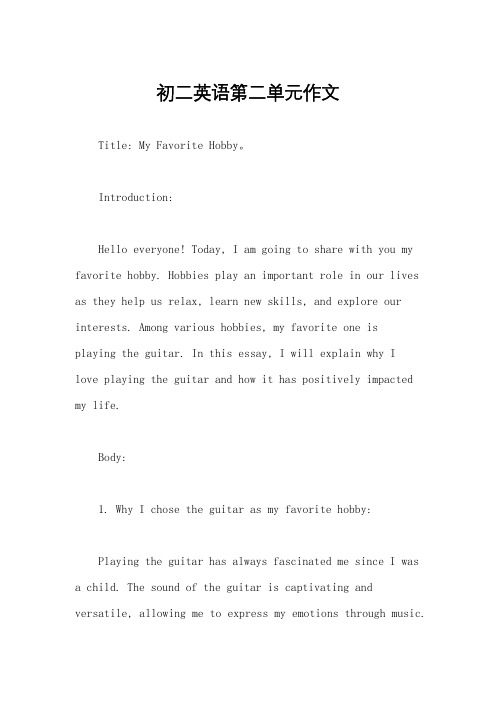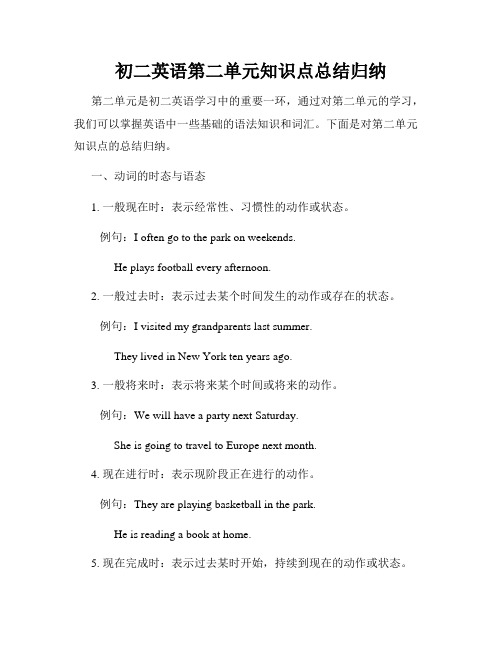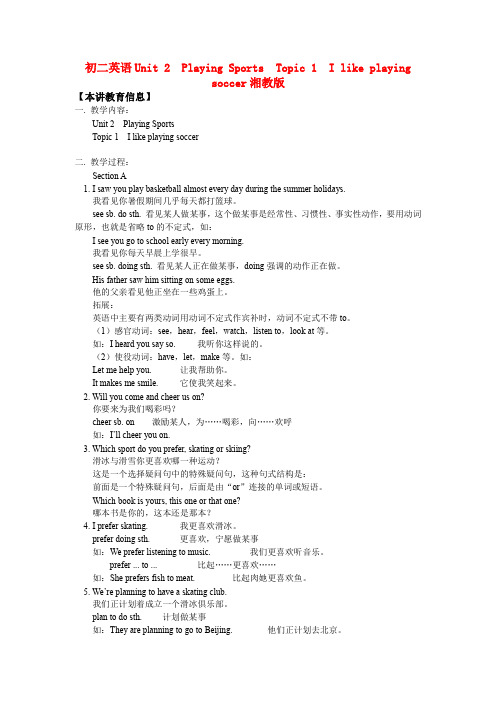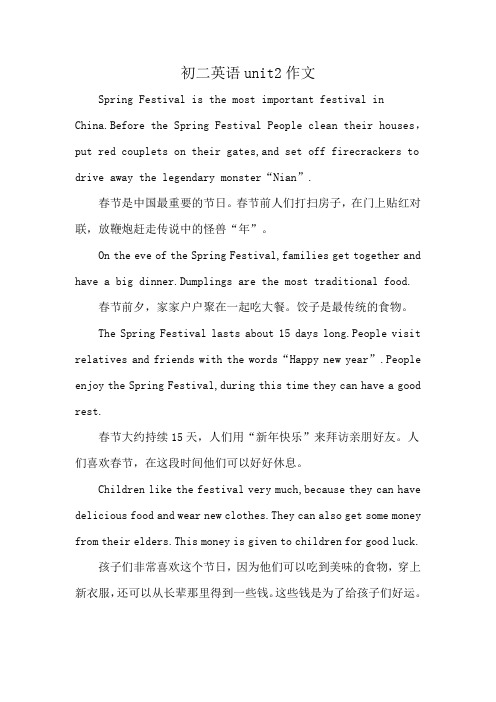初二英语2(
初二上册英语unit2单词

初二上册英语unit2单词Unit 2 How often do you exercise?一、重点单词。
1. housework ['haʊswɜːk] n. 家务劳动;家务事。
2. hardly ['hɑːdli] adv. 几乎不;几乎没有。
3. ever ['evə(r)] adv. 在任何时候;从来;曾经。
4. once [wʌns] adv. 一次;曾经。
5. twice [twaɪs] adv. 两次;两倍。
6. Internet ['ɪntənet] n. (国际)互联网;因特网。
7. program ['prəʊɡræm] n. (= programme)节目。
8. full [fʊl] adj. 忙的;满的;充满的。
9. swing [swɪŋ] n. 摆动;秋千v. (使)摆动;摇摆。
10. maybe ['meɪbi] adv. 大概;或许;可能。
11. least [liːst] adv. 最小;最少adj. & pron. 最小的;最少的。
12. junk [dʒʌŋk] n. 无用的东西;无价值的东西。
13. coffee ['kɒfi] n. 咖啡。
14. health [helθ] n. 健康;人的身体(或精神)状态。
15. result [rɪ'zʌlt] n. 结果;后果。
16. percent [pə'sent] n. (= per cent)百分之……17. online [ˌɒn'laɪn] adj. & adv. 在线(的);联网(的)18. television ['telɪvɪʒn] n. 电视节目;电视机。
19. although [ɔːl'ðəʊ] conj. 虽然;尽管;即使。
20. through [θruː] prep. 以;凭借;穿过。
初二英语第二单元作文

初二英语第二单元作文Title: My Favorite Hobby。
Introduction:Hello everyone! Today, I am going to share with you my favorite hobby. Hobbies play an important role in our lives as they help us relax, learn new skills, and explore our interests. Among various hobbies, my favorite one isplaying the guitar. In this essay, I will explain why Ilove playing the guitar and how it has positively impacted my life.Body:1. Why I chose the guitar as my favorite hobby:Playing the guitar has always fascinated me since I was a child. The sound of the guitar is captivating and versatile, allowing me to express my emotions through music.Additionally, I admire guitarists who can skillfully play different genres of music, which motivates me to improve my own skills.2. The benefits of playing the guitar:Playing the guitar has numerous benefits, both mentally and physically. Firstly, it helps me relax and reduce stress. Whenever I feel overwhelmed or tired, strumming the strings of my guitar instantly calms me down and allows me to escape from the pressures of daily life. Moreover, playing the guitar improves my focus and concentration. It requires me to read sheet music, remember chords, and coordinate my fingers, all of which enhance my cognitive abilities.3. How playing the guitar has positively impacted my life:Playing the guitar has had a significant impact on my life in several ways. Firstly, it has improved my self-confidence. Performing in front of an audience, whetherit's my family or friends, has boosted my self-esteem and helped me overcome stage fright. Secondly, playing theguitar has also broadened my social circle. I have met many fellow guitar enthusiasts through music classes and online communities, allowing me to form new friendships and share my passion with others.4. My journey of learning the guitar:Learning to play the guitar has been a challenging yet rewarding journey. I started by taking basic guitar lessons, where I learned the fundamental techniques and chords. As I progressed, I began exploring different music styles and experimenting with my own compositions. I also enjoy watching online tutorials and attending workshops tofurther enhance my skills. Although there have been moments of frustration and setbacks, the joy of playing the guitar always keeps me motivated to continue improving.Conclusion:In conclusion, playing the guitar is my favorite hobbydue to its captivating sound, numerous benefits, and positive impact on my life. It has helped me relax, improve my focus, boost my self-confidence, and expand my social circle. Learning to play the guitar has been an exciting journey, and I look forward to further exploring this wonderful instrument. If you haven't already, I encourage you to find a hobby that brings you joy and fulfillment, just like playing the guitar does for me.。
人教版英语初二下册 Unit 2 I`ll help to clean up the city park 知识讲解

Unit 2 I’ll help to clean up the city parks.词句精讲精练词汇精讲1. clean upclean up意为“打扫”,up为副词,此短语是动副型短语,如果宾语为代词,应放在短语中间;如果宾语是名词,可放于短语之间或两词之后。
例如:Please clean up this street at once. 请马上把这条街打扫干净。
This street is dirty. Please clean it up. 这条街道太脏了,请把它打扫干净。
2. cheer upcheer up意为“变得高兴,振奋起来”,是“动词+副词”结构的短语。
cheer up既可作及物动词短语,也可作不及物动词短语。
例如:He cheered up at once when I agreed to help him. 我同意帮助他时,他马上高兴起来。
Cheer up! The news isn’t too bad. 振作起来!这消息不是太坏。
He took her to the cinema to cheer her up. 为了让她高兴,他带她去了电影院。
【拓展】(1) cheer作不及物动词,意为“欢呼;喝彩”。
例如:The girls cheered as the famous singer arrived. 当这位著名的歌手到达时,女孩子们大声欢呼。
(2) cheer作及物动词,意为“为……欢呼,高呼”。
例如:The whole village turned out to cheer the hero. 全村人都出来向那位英雄欢呼。
(3) cheer作可数名词,意为“欢呼声;喝彩声”。
例如:We can hear the cheers of students outside the gym. 我们在体育场外就能听到学生的欢呼声。
(4) cheer on意为“为……加油”。
例如:We will have a basketball game this afternoon. Would you like to come and cheer us on?我们今天下午有一场篮球比赛,你愿意来为我们加油吗?3. give outgive out意为“散发;分发”,相当于hand out,是“动词+ 副词”结构的短语动词。
unit2《schoollife》知识讲解(牛津英语初二上)doc初中英语

unit2《schoollife》知识讲解(牛津英语初二上)doc初中英语学习内容一、Language points 重点难点讲二、综合技能和发音课文讲解一、Language points 重点难点讲1.Daniel wants to learn more about the subjects that British students study.丹尼尔想了解更多有关英国学生所学的课程的情形。
句中的study为及物动词,它的宾语是引导定语从句的关系代词that.▲study作及物动词或不及物动词,意为〝学习〞〝研究〞。
如:①All of then study hard.他们大伙儿都努力学习。
②They are studying the beginning of life.他们正研究生命的起源。
▲study 也可作名词,意为〝研究〞〝学习〞〝书房〞。
如:①They are making a study of UFO.他们正在对不明飞行物进行研究。
②How are you getting on with your studies ?你的学习情形如何?▲learn 作〝学习〞解时,一样指学习、学会较简单的东西,后接动词不定式作宾语。
作〝明白〞解时,可接从句作宾语。
Learn of /about 意为〝了解〞〝听讲〞。
如:①They are learning some new words. 他们在学一些新单词。
②We are learning to drive/how to drive. 我们在学开车。
听到他逝世的消息我们专门难过。
[注]在表示〝学习科目〞的两词可换用。
如:①He learns /studies English. 他学英语。
2.John wrote back and attached some pictures to his e-mail.约翰回复了并把一些照片粘贴到了电子邮件上。
attach 作及物或不及物动词,意为〝附上〞〝加上〞〝贴上〞,常与介词to连用。
初二英语2单元句子

听写(unit2)1. 怀特一家没有足够的时间给我们写信,只好给我们打了个电话。
2.她很抱歉没有把比赛的票给我们。
3. 他付不起饭钱,只好向妈妈求助。
4. 我发现我们很难很早入睡。
能告诉我们该怎么办?5.他有时找我们借点钱,但从未忘记尽快还给我们。
6. 直到与同学相处好了才停止与同学打架。
7. 除他外,人人都在抱怨穿过时衣服。
8. 现在是把我们同那个好学生比比的时候了。
难道我们不比他好得多吗?9. 很快的吃了晚饭后,他们必须回到书房开始工作。
10. 在一方面,我们需要尽量多学。
在另一方面,我们需要参加大量的课后有组织的活动。
11. 当他还是一个很小的小孩时,就被送去一个人住到学校了。
12. 我们感到我们必须要学会如何为自己设计自己的生活。
13. 尽管你还没有到穿那条裙子的年龄,但那裙子适合你(穿)14. 在那条大河的每一边都有一条很繁华的马路。
*15. 我回家既可以赶车,也可步行。
Answers:1.怀特一家没有足够的时间给我们写信,只好给我们打了个电话。
The Whites didn’t have enough time to write a letter to us. They had to give us a call.The Whites were too busy (not free enough) to write to us.2.她很抱歉没有把比赛的票给我们。
She felt sorry that she failed to give us the tickets to the match.3. 他付不起饭钱,只好向妈妈求助。
He couldn’t pay for (couldn’t afford) the dinner and had to ask his mother for help.4. 我发现我们很难很早入睡。
能告诉我们该怎么办?I found it hard for us to fall asleep(go to sleep) early. Can you tell us what to do(What we should/can do?5.他有时找我们借点钱,但从未忘记尽快还给我们。
八年级英语第二单元笔记

八年级英语第二单元笔记English: In the second unit of eighth-grade English, we learned about a variety of topics including family, friends, and relationships. We discussed different types of families, such as nuclear families and extended families, as well as the roles and responsibilities within a family. We also learned about the importance of communication and conflict resolution within families and among friends. Additionally, we talked about the qualities of a good friend and the importance of building and maintaining positive relationships. Throughout the unit, we practiced speaking, listening, reading, and writing to improve our language skills and deepen our understanding of the topics.中文翻译:在八年级英语的第二单元中,我们学习了关于家庭、朋友和人际关系等多种主题。
我们讨论了不同类型的家庭,如核心家庭和大家庭,以及家庭内的角色和责任。
我们还学习了家庭和朋友之间沟通和冲突解决的重要性。
此外,我们也谈论了一个好朋友的品质以及建立和维护积极关系的重要性。
初二英语第二单元知识点总结归纳

初二英语第二单元知识点总结归纳第二单元是初二英语学习中的重要一环,通过对第二单元的学习,我们可以掌握英语中一些基础的语法知识和词汇。
下面是对第二单元知识点的总结归纳。
一、动词的时态与语态1. 一般现在时:表示经常性、习惯性的动作或状态。
例句:I often go to the park on weekends.He plays football every afternoon.2. 一般过去时:表示过去某个时间发生的动作或存在的状态。
例句:I visited my grandparents last summer.They lived in New York ten years ago.3. 一般将来时:表示将来某个时间或将来的动作。
例句:We will have a party next Saturday.She is going to travel to Europe next month.4. 现在进行时:表示现阶段正在进行的动作。
例句:They are playing basketball in the park.He is reading a book at home.5. 现在完成时:表示过去某时开始,持续到现在的动作或状态。
例句:I have learned English for three years.She has written five letters this week.6. 一般被动语态:表示动作的接受者比较重要,而不注重动作的执行者。
例句:The book is read by many students.The cake was eaten by the children.二、形容词与副词的比较级与最高级1. 形容词的比较级:在两个人或事物之间进行比较时所使用的形式。
例句:He is taller than me.This book is more interesting than that one.2. 形容词的最高级:在三个或三个以上的人或事物之间进行比较时所使用的形式。
初二英语上册unit2单词

初二英语上册unit2单词人教版初二英语上册Unit 2单词。
一、housework ['haʊswɜːk] n. 家务劳动;家务事。
1. 例句:I often help my mother with the housework.(我经常帮我妈妈做家务。
)二、hardly ['hɑːdli] adv. 几乎不;几乎没有。
1. 用法:hardly为否定副词,位于实义动词之前,be动词、助动词、情态动词之后。
2. 例句:I can hardly understand what he said.(我几乎听不懂他说的话。
)三、ever ['evə(r)] adv. 在任何时候;从来;曾经。
1. 例句:Have you ever been to Beijing?(你曾经去过北京吗?)四、hardly ever几乎从不。
1. 例句:He hardly ever watches TV.(他几乎从不看电视。
)五、once [wʌns] adv. 一次;曾经。
1. 用法:可用于一般过去时,表示过去的某个时间“一次”或者“曾经”。
2. 例句:I went to Paris once.(我去过巴黎一次。
)六、twice [twaɪs] adv. 两次;两倍。
1. 例句:I have been to this city twice.(我去过这个城市两次。
)七、Internet ['ɪntənet] n. (国际)互联网;因特网。
1. 例句:We can get a lot of information on the Internet.(我们能在互联网上得到很多信息。
)八、program ['prəʊɡræm] n. (= programme)节目。
1. 例句:My favorite TV program is the news.(我最喜欢的电视节目是新闻。
)九、full [fʊl] adj. 忙的;满的;充满的。
八年级英语Unit 2 Playing Sports Topic 1 I like playing soccer湘教版知识精讲

初二英语Unit 2 Playing Sports Topic 1 I like playingsoccer湘教版【本讲教育信息】一. 教学内容:Unit 2 Playing SportsTopic 1 I like playing soccer二. 教学过程:Section A1. I saw you play basketball almost every day during the summer holidays.我看见你暑假期间几乎每天都打篮球。
see sb. do sth. 看见某人做某事,这个做某事是经常性、习惯性、事实性动作,要用动词原形,也就是省略to的不定式,如:I see you go to school early every morning.我看见你每天早晨上学很早。
see sb. doing sth. 看见某人正在做某事,doing强调的动作正在做。
His father saw him sitting on some eggs.他的父亲看见他正坐在一些鸡蛋上。
拓展:英语中主要有两类动词用动词不定式作宾补时,动词不定式不带to。
(1)感官动词:see,hear,feel,watch,listen to,look at等。
如:I heard you say so. 我听你这样说的。
(2)使役动词:have,let,make等。
如:Let me help you. 让我帮助你。
It makes me smile. 它使我笑起来。
2. Will you come and cheer us on?你要来为我们喝彩吗?cheer sb. on 激励某人,为……喝彩,向……欢呼如:I’ll cheer you on.3. Which sport do you prefer, skating or skiing?滑冰与滑雪你更喜欢哪一种运动?这是一个选择疑问句中的特殊疑问句,这种句式结构是:前面是一个特殊疑问句,后面是由“or”连接的单词或短语。
初二英语unit2作文

初二英语unit2作文Spring Festival is the most important festival in China.Before the Spring Festival People clean their houses,put red couplets on their gates,and set off firecrackers to drive away the legendary monster“Nian”.春节是中国最重要的节日。
春节前人们打扫房子,在门上贴红对联,放鞭炮赶走传说中的怪兽“年”。
On the eve of the Spring Festival,families get together and have a big dinner.Dumplings are the most traditional food.春节前夕,家家户户聚在一起吃大餐。
饺子是最传统的食物。
The Spring Festival lasts about 15 days long.People visit relatives and friends with the words“Happy new year”.People enjoy the Spring Festival,during this time they can have a good rest.春节大约持续15天,人们用“新年快乐”来拜访亲朋好友。
人们喜欢春节,在这段时间他们可以好好休息。
Children like the festival very much,because they can have delicious food and wear new clothes.They can also get some money from their elders.This money is given to children for good luck.孩子们非常喜欢这个节日,因为他们可以吃到美味的食物,穿上新衣服,还可以从长辈那里得到一些钱。
八年级(初二)上册英语2_频度副词用法专练

Unit2 频度副词用法专练单项选择1. My father usually ____ to work.A. driveB. drivesC. droveD. is driving2. —____ do you go to the movies?—Hardly ever.A. How oftenB. How oldC. How manyD. How much3. —Ms. Lin is very popular among the students.—Yes. Her classes are ____ lively(生动的) and interesting.A. alwaysB. sometimesC. hardlyD. never4. English people ____ use “Mr.” before a man’s first name.A. neverB. usuallyC. oftenD. hardly5. —Do you often go fishing with your father?—No, ____. I don’t like fishing at all.A. neverB. alwaysC. usuallyD. often6. Speak aloud, please! I can ____ hear you.A. usuallyB. almostC. hardlyD. nearly7. —____ do you write to your pen friend?—Once a week.A. How longB. How soonC. How farD. How often8. He ____ late for school.A. is oftenB. often isC. does oftenD. often does9. Zhang Hao ____ watches TV. He likes using the Internet.A. hard everB. hardly everC. doesn’t hard everD. doesn’t hardly ever10. He hardly does his homework at home, ____?A. is heB. isn’t heC. does heD. doesn’t he参考答案及解析1. B usually意为“通常”,是表示频率的副词,常用于一般现在时。
初二英语unit2单词表

初二英语unit2单词表Unit2 单词housework ['haswk] n.家务劳动hardly ['hɑdli] adv.几乎不;简直不;刚刚ever ['ev(r)] adv.曾经;在任何时候once [wns] adv.一次;曾经twice [twas] adv.两倍;两次Internet ['ntnet] n.因特网program ['prɡrm] n.节目;程序;课程;节目单full [fl] adj.满的;充满的;完全的swing [sw] n.摇摆;秋千v.摇摆;旋转maybe ['mebi] adv.或许;也许;可能swing dance摇摆舞least [list] adj.最小的;最少的at least至少hardly ever很少;几乎从不;难得junk n.垃圾;废旧杂物coffee ['kfi] n.咖啡;咖啡色health [helθ] n.健康;人的身体或精神状态result [r'zlt] .结果;后果percent [p'sent] adj.百分之...的online [n'lan] adj.在线的adv.在线television ['telvn] n.电视机;电视节目although [l'] conj.虽然;尽管;然而;可是through [θru] prep.穿过;凭借;一直到body ['bdi] n.身体mind [mand] .头脑;想法;意见;心思such [st] adj.这样的;如此的together [t'ɡe(r)] adv.共同;一起die [da] v.死;枯竭;消失writer ['rat(r)] n.作者;作家dentist ['dentst] n.牙科医生magazine ['mɡzin] n.杂志however [ha'ev(r)] adv.然而;无论如何;不管多么than [n] conj.比almost ['lmst] adv.几乎;差不多none [nn] pron.没有人;没有任何东西,毫无less [les] adj.更少的;较少的point [pnt] n.看法;要点;重点;小数点;目标;分数such as例如;诸如junk food n.垃圾食品;无营养食品more than超过;多于;不仅仅;非常less than不到;少于。
人教版初二英语八年级上册Unit2知识点

人教版初二英语八年级上册Unit2知识点Unit2 How often do you exercise?【重点语法】1. 频率副词: always,usually, often, sometimes, never频率副词在句中通常放在实义动词之前, be动词或助动词之后。
常用于一般现在时态中。
2.“次数”的表达方法一次once,两次twice,三次或三次以上:基数词+ times, 如:three times, five times,3. how often“多久一次”问频率,回答常含有频率词组或短语。
常见的how疑问词:1)How soon 多久(以后)—How soon will he be back?他多久能回来?—He will be back in amonth. 他一个月后能回来。
2)how long “多久”—How long did it take you toclean the house? 你打扫房子用了多久?—It took me half an hour to cleanthe house. 我打扫这房子用了半小时。
3)How many+名复How much+不可名“多少” 问数量(how much 还可问价格)【重点短语】1. go to the movies 去看电影2. look after = take care of 照顾3. surf the internet 上网4. healthy lifestyle 健康的生活方式5. go skate boarding 去划板6. keep healthy=stay healthy 保持健康7. eating habits 饮食习惯8. take more exercise 做更多的运动9. the same as 与什么相同10. be different from 不同11. once a month一月一次12. twice a week一周两次13. make a difference to 对......有影响/作用14. most of the students=moststudents15. shop=go shopping=do someshopping 购物16. be good for 对......有益17. be bad for 对......有害18. come home from school放学回家19. of course = certainly = sure 当然20. get good grades 取得好成绩21. keep/be in good health 保持健康22. take a vacation 去度假【词语辨析】1.maybe / may bemaybe 是副词,意为“大概,可能,或许”,一般用于句首。
八年级英语 Module 2 Experiences 外研社(新标准)

初二英语Module 2 Experiences外研社(新标准)一、学习目标:1.正确运用本模块的重点单词、短语和句型。
2.了解现在完成时的基本结构和用法。
3.能用英语与他人简单交流自己的经历。
二、重点、难点:现在完成时的基本结构和用法。
三、知能提升:(一)重点单词[单词学习]1. experiencen.经验(不可数),经历(可数)【例句】Shehaslittleexperiencebecauseshehasworkedforonlyonemonth.HehadmanyinterestingexperienceswhiletravellinginAfrica.[考题]Mr.Guoisateacherofmuchteaching__________(经验).【用法】用作动词,表示“体验”“经历”等。
【例句】Heexperiencedagreatadventure.2.kindn.种类;adj.仁慈的,和善的【用法】allkindsof各种各样的【例句】Thereareallkindsofanimalsinthezoo.It’skindofyoutoinvitemetoyourparty.注意:Thiskindofbooks is verygood.这类书都很不错。
(把这类书看作一个整体)3.problem n. 问题,难题【考查点】辨析:problem与questionproblem指说话者认为难以解决的问题,它与动词solve或settle(解决)搭配。
而question指说话者需要寻找答案的问题,它常与动词ask或answer连用。
【例句】Theproblemisdifficulttosolve.MayIaskyousomequestions?[考题]Theyhavesome________aboutgettingthere.A.questionsB.problemsC.questionD.problem答案:B解题思路:要完成以上题目,必须了解question和problem的区别,从而选择正确答案。
青岛市初中英语八年级上册 Unit 2(培优专题)

一、选择题1.Tom's Chinese is poor. He wants me ________ him ________ his Chinese.A.to help;with B.help;to study C.helping;with D.to help;studying A 解析:A【解析】【详解】句意:汤姆的中文很差,他想让我帮助他学习中文。
Help动词,帮助;固定搭配帮助某人做某事help sb (to) do sth,help sb with sth。
想要某人做某事固定搭配want sb to do sth,故第一空为to help,第二空为with或(to) study,故选A。
2.Reading aloud is the best way English.A.to learn B.learning C.to learning D.learns A解析:A【解析】试题分析:句意:大声读是学习英语的最好的方法。
……的方法/钥匙/答案/票是way/key/answer/ticket to +do /名词,不用of。
故选C。
考点:考查非谓语动词的用法。
3.—What about_______ a rest? —OK!Let’s go for a walk.A.to have B.hadC.have D.having D解析:D【解析】试题分析:句意:休息一会儿怎样?好!我们去散散步吧。
所填动词跟在介词之后该用动名词,所以选D。
考点:考查非谓语动词。
4.---I think there will be __________ air pollution whenever there are _________ people driving--- That’s true! I hope the air will be fresher soonA.less; less B.less; fewer C.fewer; fewer D.fewer ;less B解析:B【解析】【详解】句意:----我认为只要少开车,空气污染就会减少。
初二英语第二单元知识点总结

初二英语第二单元知识点总结初二英语第二单元主要涉及以下几个知识点:1. 表达频率的副词:always(总是)、usually(通常)、often (经常)、sometimes(有时候)、rarely(很少)、never(从不)等。
例句:I always do my homework after school.(我总是放学后做作业。
)2. 动词的一般现在时:表示经常性或普遍性的动作或状态。
例句:She goes to school by bike.(她骑自行车去学校。
)3. 一般现在时的疑问句和否定句:疑问句在句首使用助动词do或does,否定句在动词后加not。
例句:Do you like playing basketball?(你喜欢打篮球吗?)She does not eat meat.(她不吃肉。
)4. 掌握一些常见的动词短语:例如go swimming(去游泳)、watch TV(看电视)、play soccer(踢足球)等。
例句:I like to watch TV in the evening.(我喜欢晚上看电视。
)5. 表示喜欢和不喜欢的动词:如like(喜欢)、love(喜爱)、enjoy(喜欢)、dislike(不喜欢)、hate(恨,讨厌)等。
例句:He enjoys playing the piano.(他喜欢弹钢琴。
)6. 一般现在时与频率副词的搭配:表示经常性或固定的动作。
例句:He often visits his grandparents on weekends.(他经常在周末去看望他的祖父母。
)这些知识点可以帮助学生在日常交流中正确表达频率、喜好和习惯等信息。
同时,也为后续学习英语时态和句型提供了基础。
初二二年级英语2单元作文

初二二年级英语2单元作文The journey of learning a new language can be both exhilarating and challenging for students at the junior high school level. As a second-year student in the English Unit 2 curriculum, I have had the opportunity to delve deeper into the complexities of the English language and expand my communication skills. This essay will reflect on my experiences and insights gained throughout this enriching educational process.One of the key aspects of Unit 2 that has left a lasting impression on me is the emphasis on vocabulary development. The introduction of a wide range of new words, their meanings, and their contextual usage has been instrumental in enhancing my overall language proficiency. I have found great satisfaction in meticulously learning the nuances of these terms and incorporating them seamlessly into my written and spoken expression.Moreover, the unit's focus on grammar structures has been particularly enlightening. Through a systematic approach to understanding sentence formation, verb tenses, and grammaticalrules, I have gained a deeper appreciation for the intricacies of the English language. The ability to correctly construct sentences and convey my thoughts with clarity has been a significant milestone in my language learning journey.Alongside the acquisition of vocabulary and grammar, the unit has also placed a strong emphasis on developing my reading and comprehension skills. The diverse range of reading materials, from literary excerpts to informative passages, has challenged me to engage with the text on a deeper level. I have learned to identify the main ideas, extract relevant information, and draw meaningful conclusions from the written content. This skill set has not only improved my understanding of the English language but has also broadened my overall knowledge and critical thinking abilities.One of the most rewarding aspects of Unit 2 has been the opportunity to practice and enhance my writing skills. The unit has provided a structured framework for composing various forms of written expression, from personal narratives to persuasive essays. Through regular writing assignments and feedback from my teacher, I have honed my ability to organize my thoughts, develop coherent arguments, and communicate effectively in written form. This experience has instilled in me a greater confidence in my writing abilities and has equipped me with the necessary tools to tackle more complex writing tasks in the future.In addition to the academic components of the unit, the integration of cultural elements has been a particularly enriching aspect of my learning experience. The inclusion of materials that explore the customs, traditions, and perspectives of English-speaking countries has fostered a deeper understanding and appreciation for cultural diversity. This cross-cultural exposure has not only broadened my understanding of the English-speaking world but has also encouraged me to reflect on my own cultural identity and how it shapes my worldview.Throughout this unit, I have also had the privilege of engaging in interactive learning activities that have further reinforced my language skills. From group discussions and presentations to role-playing exercises, these collaborative experiences have allowed me to practice my speaking and listening abilities in a supportive and engaging environment. The opportunity to interact with my classmates and receive feedback has been invaluable in improving my communication skills and building my confidence as an English language learner.As I reflect on my journey through Unit 2, I am filled with a sense of accomplishment and excitement for the continued growth and development of my English language proficiency. The challenges I have faced and the progress I have made have instilled in me a deeprespect for the complexities of the English language and a renewed dedication to mastering its nuances.Looking ahead, I am eager to apply the knowledge and skills I have acquired in Unit 2 to further expand my linguistic abilities. I anticipate the opportunity to delve into more advanced topics, explore new genres of literature, and engage in more complex written and oral communication tasks. With the solid foundation laid by this unit, I am confident that I will be well-equipped to tackle the upcoming challenges and continue my journey towards becoming a proficient English language user.In conclusion, my experiences in the English Unit 2 curriculum have been truly transformative. The comprehensive approach to language learning, the integration of cultural elements, and the engaging learning activities have all contributed to my growth as a student and a language learner. As I move forward, I am excited to continue building upon the skills and knowledge I have gained, and to embrace the ongoing challenge of mastering the English language.。
八年级上册英语二单元笔记

八年级上册英语二单元笔记一、单元概述本单元我们学习了家庭成员和亲戚之间的关系和互动,以及如何使用英语进行表达。
通过学习,我们了解了不同文化背景下家庭成员之间的差异,并学习了如何使用英语进行交流。
本单元的词汇和语法重点包括名词、形容词、动词和副词等。
二、重点词汇学习1. 名词:我们学习了家庭成员的名词,例如爸爸、妈妈、爷爷、奶奶、叔叔、姑姑等。
这些名词在句子中通常作为主语或宾语。
2. 形容词:我们学习了描述家庭成员的形容词,例如可爱的、聪明的、勇敢的等。
这些形容词用来修饰名词,表达对其的看法或评价。
3. 动词:我们学习了与家庭成员相关的动词,例如爱、喜欢、关心等。
这些动词表达了与家庭成员之间的情感联系。
4. 副词:我们学习了描述动作或状态的副词,例如经常、总是、偶尔等。
这些副词用来修饰动词,表达动作的频率或程度。
三、语法学习本单元的语法重点是学习名词和形容词的用法。
我们学习了如何使用名词来描述家庭成员和亲戚,以及如何使用形容词来描述他们的特征和品质。
例如,“我的妈妈很善良”或“他的妹妹很聪明”等句子。
四、课文理解在理解课文时,我们需要关注句子的语法结构、单词的含义以及句子的语境。
例如,在句子“我非常爱我的父母”中,“我”指的是第一人称,“父母”是名词,“非常爱”是动词。
通过理解这些信息,我们可以更好地理解句子的含义。
五、练习与反思在完成老师布置的练习题时,我们需要仔细阅读题目要求,认真分析句子结构,并尝试使用所学词汇和语法知识来解答问题。
同时,我们也需要反思自己在解题过程中是否正确理解了题意,是否准确使用了所学知识。
通过不断的练习和反思,我们可以提高自己的英语水平。
六、拓展阅读为了进一步扩展知识面,我建议大家阅读一些与家庭生活相关的英文文章或书籍,例如一些描述不同文化背景下家庭成员之间的故事或者书信等。
通过阅读这些文章或书籍,我们可以更好地了解不同文化背景下家庭成员之间的关系和互动方式,从而更好地运用英语进行交流。
- 1、下载文档前请自行甄别文档内容的完整性,平台不提供额外的编辑、内容补充、找答案等附加服务。
- 2、"仅部分预览"的文档,不可在线预览部分如存在完整性等问题,可反馈申请退款(可完整预览的文档不适用该条件!)。
- 3、如文档侵犯您的权益,请联系客服反馈,我们会尽快为您处理(人工客服工作时间:9:00-18:30)。
初二英语复习(一)一、重点词、句辨别1、buy、spend、pay、cost和takebuy、spend、pay、cost和take都有“花费”的意思。
区别在于:buy sb sth=buy sth for sb给某人买某物,是这五个单词中唯一一个可以跟双宾语的spend:sb spend some time/money on sth 某人花多少钱买某物/花多少时间多某事sb spend some time (in)doing sth 某人花多少时间在某事上面,in可以省略pay:sb pay some money for sth 某人为某物付多少钱pay some money for sb 为某人付钱pay back 还钱pay off 还清cost:主语一定是物,sth cost sb some money 某物花了某人多少钱take:有一个固定句型:it take sb some time/money to do sth 做某事花了某人多少时间/多少钱2、sure的用法be sure that+句子be sure of sth.be sure to do sth.3、such和for example1) for example用来举例说明某一论点或情况,一般只举同类人或物中的"一个"为例,作插入语,可位于句首、句中或句末,后面应加逗号隔开。
I like ball games ,for example ,volleyball and basketball.我喜欢球类运动,比如棒球和篮球。
2) such as用来列举事物时,一般列举同类人或事物中的几个例子。
插在被列举的事物与前面的名词之间,as后面不可有逗号。
English is spoken in many countries, such as Australia and Canada. 许多国家都讲英语,例如澳大利亚和加拿大。
4、fall 与dropfall 与drop两者都可表示“掉”、“落”,区别如下:1). 表示从高处往下掉或降,两者有时可互换。
如:The temperature has dropped [fell]. 气温降低了。
He dropped [fell] from the top of the building. 他从屋顶掉了下来。
2). (1)fall 表示“落下”,多指无意识的行为,有自然坠落之意,且通常是不及物动词。
Rain began to drop [fall]. 开始下起雨来了。
(2)drop 既可指无意的行为,即表示“落下”(不及物),也可指有意的行为,即表示“投下”(及物)。
如Drop the hammar down to me. 把锤子扔下来给我。
He dropped the letter into the mail-box. 他把信投入信箱。
Medical supplies are being dropped to the stricken area. 目前正将医药用品空投到灾区。
二、重点语法讲解——状语从句修饰主句中的动词, 形容词和副词, 通常有从属连词引导, 按其意义和作用可分为时间, 地点, 条件, 原因, 让步, 目的, 结果, 方式, 比较.等1. 时间状语从句:1) 常见连词有after, as, before, once, since, till, (not)until, when, whenever(no matter when), while, as long as, as soon as etc.2) no sooner…than, hardly(scarcely, barely)…when: 刚做…就….3) 还有immediately, directly, instantly, the moment, the minute, the instant, the second, every time etc2. 地点状语从句: 一般用where or wherever 引导3. 条件状语从句:真实条件从句:if, unless, so long as, provided that, supposing that, on condition that, in the event that, in case that etc4. 原因状语从句: 从属连词有because, as ,since, for, now, that, in that, seeing that, considering that(鉴于,由于)5. 让步状语从句:1): even if, though, even though, while(尽管) no matter what/how/which, however, whatever, whichever, however etc.2) 由as 引起的让步从句, 语气较强烈,被强调的词须放在句首.3) whether…or,不管…或…6. 结果状语从句: so that, so…that, such…that7. 目的状语从句: so that, in order that, for fear that, lest, in case8. 方式状语从句: as, just as, as if: 如同…一样9. 比较状语从句:1) as…as, not so/as…as2) 比较级+than, so much/a lot more than3) no more…than, not more…than, less…than4) the more…the more附:no more than adv. 只是;仅仅Each class has no more than 8 students.每个班级的学生不超过8个。
Most molecules live for no more than weeks at a time.要知道大多数分子的寿命都不超过一星期。
The American Heart Association advises no more than 3 grams for healthy people.美国心脏协会建议,对健康人来说,每天食盐不应超过3克。
以上,都有"只不过/仅仅"强调很少的意思.not more than 就没有"很少"这种意思.只是客观上说,不多于...not more than不超过;至多;不比…更…And the earholes are not more than three.还有耳洞不能超过三个。
Answer these questions in not more than 75 words.回答以下问题,不要超过75个单词。
I have not more than three relatives in this city.在这个城里,我至多只有三个亲戚。
三、试题演练基础知识(共两部分,30小题,计30分)Ⅰ.词汇(共10个小题,每小题1分,计10分)A)圈出每组中不同类的那个词,并写在答题卷的相应位置。
(提示:判断是否同类的法则,先是看是否词性相同;若都是同词性词,则看它们所表示的范畴)21. unpleasant, impossible, impolite, improve22. discover, foreigner, winner, litter23. European, Asian, African, Russian24. huge, low, less, loud25. boring, amazing, spring, interestingB)释义:从下列选项中选出一个与划线部分意思相同或相近的答案。
26. What‟s wrong with your computer?A. What aboutB. What‟s troubleC. What‟s the matter27. I gave him a ring last Sunday, but he was out.A. phoned himB. rang up himC. shouted at him28. Mr Smith reached Beijing at 9:00 last night.A. gotB. arrived atC. came29. I saw him crossing the bridge.A. went acrossB. going throughC. going across30. If you miss so many lessons, you‟ll fail the exam.A. don‟t haveB. don‟t wantC. catchⅡ.单项填空(共20小题,每题1分,计20分)从A、B、C 三个选项中选出能填入空白处的最佳答案。
31. What ____ you ______ at this time yesterday?A. did; doB. are; doingC. were; doing32. She didn‟t go home. I didn‟t go home, _______.A. tooB. alsoC. either33. He asked me _____ a report card.A. writeB. writingC. to write34. The teacher said I could do better _____ English.A. inB. atC. for35. Thank you for ______ me with my homework.A. helpB. helpsC. helping36. ____ is easy for a child to wake up and know where they are.A. ItB. ThatC. This37. I‟m sure he will _____ pass the exam.A. canB. is able toC. be able to38. ____eye exercises ____ good _____ your eyes.A. Doing; are; forB. Do; is; forC. Doing; is; for39. The river is very dirty. ______ people want to swim in it.A. A fewB. LittleC. Few40. I‟ve been ________for five hours.A. skateB. skatingC. skated41. There are many trees on ______ side of the street.A. bothB. everyC. each42. The man _____ glasses is my physics teacher.A. withB. hasC. wears43. There is little milk in the bottle, ________?A. is itB. is thereC. isn‟t there44. How did you make him______?A. stop talkingB. to stop talkingC. stops talking45. Can you tell us ____?A. where does he liveB. where he livesC. where he does live46. — How do you usually come to school?—_____ my father‟s car.A. ByB. InC. With47. The teacher told the children that the earth ____ around the sun.A. movesB. movedC. was moving48. --- Which do you prefer, oranges or apples?---_______. I …d like bananas.A. Yes, bothB. Neither, thank youC. No, thanks49. Lin Tao is as ______ as Zhang Hua.A. strongB. strongerC. the strongest50. There are five ________ people in the city.A. millionsB. million ofC. million阅读(共两部分,20小题,计30分)Ⅰ.完形填空(共10小题,计10分)A)通读短文,从所给A、B、C三个选项中选出一个最佳选项完成短文。
